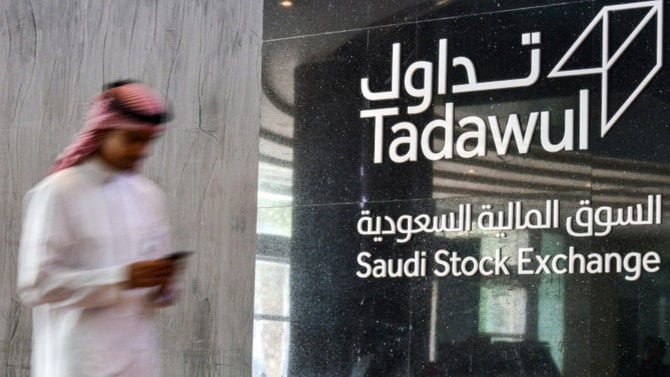Saudi stocks post worst global losses in May: Bloomberg
Saudi Arabia's Tadawul Index records the world’s steepest decline in May, as falling oil prices raise fears over mega project funding.
-

This picture taken December 12, 2019 shows a view of the sign showing the logo of Saudi Arabia's Stock Exchange Market (Tadawul) bourse in the capital Riyadh. (AFP)
Saudi Arabia’s stock market is on track to become the worst-performing in the world for May, with falling oil prices undermining investor confidence and raising fresh concerns about the future of the kingdom’s mega projects. According to Bloomberg, the Tadawul All Share Index fell 6.4% this month as of Tuesday’s close, the sharpest drop among 92 global equity benchmarks.
The Saudi exchange is also enduring its fourth consecutive month of losses, the longest such streak since 2014. As reported by Bloomberg, this performance sharply contrasts with broader emerging market indices, which are seeing their strongest gains since September.
At the heart of the decline is oil. That said, crude prices dropped to a four-year low in April, weighed down by global supply increases and ongoing trade tensions. The downturn has placed additional pressure on Saudi Arabia’s fiscal position, with the kingdom recording its widest budget deficit since 2021 in Q1, Bloomberg noted.
“There are fears that the fall in oil revenues could affect the projects market,” said Junaid Ansari of Kamco Invest in Kuwait City, referring to the kingdom’s flagship infrastructure and transformation efforts. As per Bloomberg, only 23 of the 253 listed companies on the Tadawul are trading positively this month.
Vision 2030 faces pressure as oil revenues shrink
Key index drags include Al Rajhi Bank, the country’s largest listed lender, and utility firm ACWA Power.
Brent crude is hovering around $65 per barrel, well below the levels Saudi Arabia needs to balance its books. Bloomberg Economics estimates that Riyadh requires oil at $96 to cover its base budget and $113 when factoring in sovereign fund outlays.
Dominic Bokor-Ingram of Fiera Capital told Bloomberg that some "aspirational mega projects" could face delays due to fiscal constraints, noting that Saudi Arabia’s breakeven oil price is higher than that of many of its Gulf neighbors.
“Oil prices are a headwind, and force the country to make capital allocation decisions that they wouldn’t need to if oil were at $100,” Bokor-Ingram said, as reported by Bloomberg.
OPEC+ ministers are set to meet this week to assess current quotas, with eight members expected to decide on July production levels. Bloomberg warned last month that the kingdom's deficit could swell to $67 billion in 2024, prompting borrowing and spending cuts.
Despite near-term headwinds, Bokor-Ingram told Bloomberg he remains bullish long-term, citing the enduring appeal of Saudi Arabia’s Vision 2030 strategy. “It’s too much of a risk to ignore the Saudi market for an emerging-market investor,” he added.

 3 Min Read
3 Min Read








